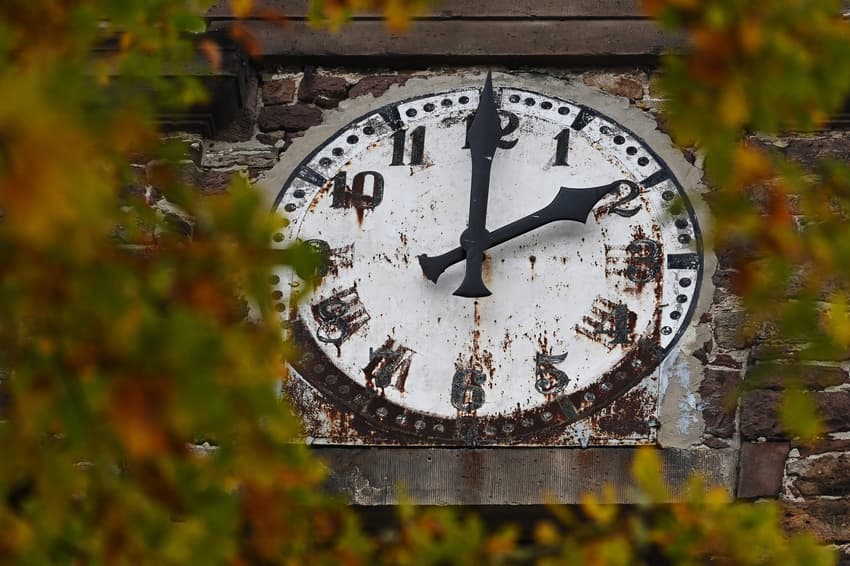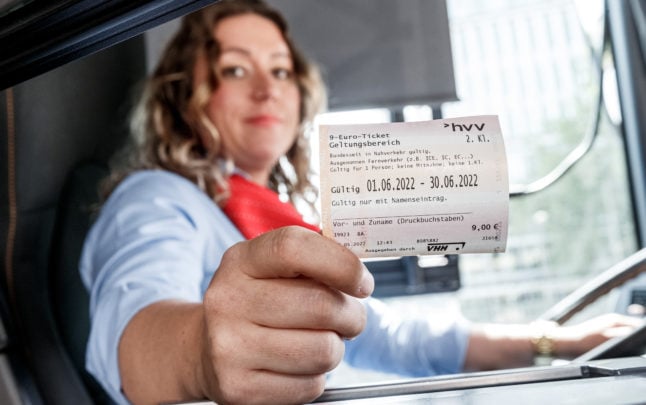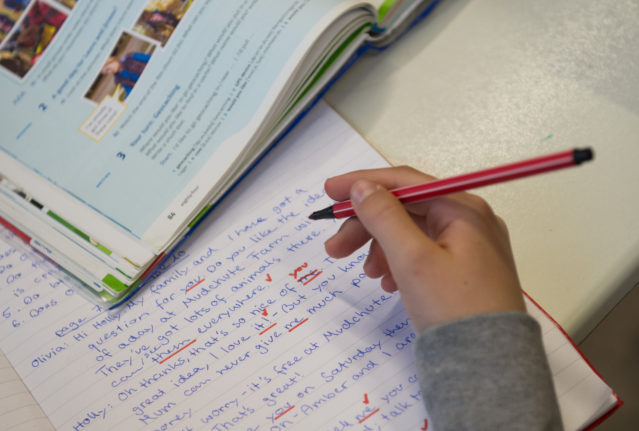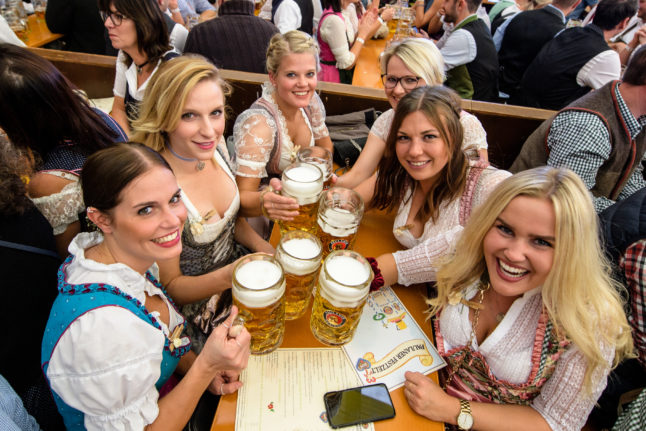Everything that changes in Germany in September 2022

From the €300 payment for workers and new energy saving rules to the end of the €9 ticket, here's what's changing in Germany this September.
One-off €300 payment to workers
In September, employees in Germany will receive a special payment to help with rising energy costs. The €300, which is subject to tax, is for people in employment and will be paid out in salaries by employers.
Some people may receive the payment in October so check with your boss if you have any questions.
Self-employed people can deduct it from their advance tax payments from September or when they submit their tax return next year.
READ MORE: What you need to know about Germany’s €300 energy relief payout
Nationwide €9 ticket comes to an end
The €9 monthly travel ticket, which is valid on public transport across Germany - including regional trains - will be no more from September 1st. It was in place for three months from June until the end of August.
There have been lots of discussions about a follow-up nationwide ticket, but nothing firm is in place at the moment. However, Berlin is planning to introduce a temporary, reduced-cost ticket.
Unfortunately, in many places it may cost more to use public transport. German press group DPA recently surveyed operators – and they said they were planning to increase the cost of their tariffs in the near future - or have already done so.
READ ALSO:
- End of €9 ticket and fuel cuts: Germany says goodbye to cheap travel
- 5 things to know about public transport in Germany after the €9 ticket

Bus driver Miriam Kara holds the €9 ticket in Hamburg. Photo: picture alliance/dpa | Markus Scholz
TIP: Ticket checkers may be out in force in the first days of September and many people could get caught out if they don't buy a valid ticket. Make sure you travel with the right ticket, and let friends and family members know that the €9 offer is no longer in place.
Fuel tax cut ends
The fuel tax discount aimed at providing relief to drivers expires at the end of August too. Prices for petrol and diesel are therefore likely to rise. The government had reduced the energy tax on fuels in June, July and August.
Pharmacies have to accept e-prescriptions
From September 1st, pharmacies throughout Germany will be required to accept digital prescriptions - known as e-prescriptions. This is also being phased in regionally to doctors.
The aim is for paper prescriptions to be consigned to the past, and patients will receive a QR code on their smartphones instead. Those who do not have the app or a smartphone will receive the code printed out on a piece of paper. The e-prescription only applies to those with statutory health insurance and not to those with private insurance.
READ ALSO: How Germany will roll out e-prescriptions this year
All schools return after summer ends
In Germany, the summer vacations are coming to an end in the last federal states. In Hesse, Rhineland-Palatinate and Saarland, school starts again on September 5th. In Bavaria and Baden-Württemberg pupils and teachers go back a week later, on September 12th. This means that students everywhere across the country will be back in class, ready for the new school year.

A pupil writes in English at a German school. Photo: picture alliance / dpa | Marijan Murat
Politics ramps up again
Due to the energy crisis, politicians arguably haven't had much of a break this summer. But political life ramps up again in September. A week of sessions in the Bundestag begins on September 6th, and as always, the budget for 2023 will be discussed.
For the government, however, the coming weeks will be about one thing in particular: the third energy relief package to help residents cope with sky-high energy bills. It is expected to be presented before the gas surcharge on consumers comes into force in October.
Regulation on energy saving comes into force
With the temperature set to cool down as we head into the tail end of summer, people may soon want to heat their homes and workplaces. But it's going to be a tough winter in Germany due to the energy crisis.
To save on gas and electricity, as well as try and reduce energy dependence on Russian energy, the German government is introducing energy-saving regulations.
From September 1st, the temperature in public buildings is not allowed to exceed 19C and there will be no hot water for hand-washing.
Landlords will also be required to encourage their tenants to save energy. Retailers will have to take certain measures such as closing doors during the heating season and turning off window lights at night.
READ ALSO: What to know about Germany's energy saving rules
Pay rise for care sector workers
Employees in the care sector will receive more money from September 1st. For skilled nursing staff, the minimum wage will increase from €15 to €17.10 per hour; for nursing staff with one or two years of training, the minimum wage will rise from the current €12.50 to €14.60; and for nursing staff without a formal training qualification, the minimum wage will increase from the current €12 to €13.70. Keep in mind that to cover these pay increases, employers could raise costs for people in care.
Oktoberfest returns
For the first time since the start of the Covid pandemic in 2020, there will be an Oktoberfest again in Munich. The huge festival is to be celebrated from September 17th to October 3rd. The 17 festival halls will offer space for around 120,000 guests.

Revellers enjoy the Oktoberfest atmosphere in September 2019. Photo: picture alliance/dpa | Matthias Balk
Get ready for these German TV shows to return
After a summer break, some German TV favourites are returning. On September 4th, the drama Tatort (Crime Scene) returns after 10 weeks without new cases. The first regular "Heute-show" (Today Show), the satirical news programme with Oliver Welke, comes back on September 9th. And the ARD Sunday talk show "Anne Will" returns on September 18th.
READ ALSO: What do Germans like to watch on TV?
Cost of Amazon Prime goes up
Amazon Prime is getting more expensive. From September 15th, the Prime membership fee will increase from €7.99 to €8.99 for monthly payments and from €69 to €89.90 for annual payments. Prime is a paid membership and the subscription includes premium shipping and access to Prime Video.
Comments
See Also
One-off €300 payment to workers
In September, employees in Germany will receive a special payment to help with rising energy costs. The €300, which is subject to tax, is for people in employment and will be paid out in salaries by employers.
Some people may receive the payment in October so check with your boss if you have any questions.
Self-employed people can deduct it from their advance tax payments from September or when they submit their tax return next year.
READ MORE: What you need to know about Germany’s €300 energy relief payout
Nationwide €9 ticket comes to an end
The €9 monthly travel ticket, which is valid on public transport across Germany - including regional trains - will be no more from September 1st. It was in place for three months from June until the end of August.
There have been lots of discussions about a follow-up nationwide ticket, but nothing firm is in place at the moment. However, Berlin is planning to introduce a temporary, reduced-cost ticket.
Unfortunately, in many places it may cost more to use public transport. German press group DPA recently surveyed operators – and they said they were planning to increase the cost of their tariffs in the near future - or have already done so.
READ ALSO:
- End of €9 ticket and fuel cuts: Germany says goodbye to cheap travel
- 5 things to know about public transport in Germany after the €9 ticket

TIP: Ticket checkers may be out in force in the first days of September and many people could get caught out if they don't buy a valid ticket. Make sure you travel with the right ticket, and let friends and family members know that the €9 offer is no longer in place.
Fuel tax cut ends
The fuel tax discount aimed at providing relief to drivers expires at the end of August too. Prices for petrol and diesel are therefore likely to rise. The government had reduced the energy tax on fuels in June, July and August.
Pharmacies have to accept e-prescriptions
From September 1st, pharmacies throughout Germany will be required to accept digital prescriptions - known as e-prescriptions. This is also being phased in regionally to doctors.
The aim is for paper prescriptions to be consigned to the past, and patients will receive a QR code on their smartphones instead. Those who do not have the app or a smartphone will receive the code printed out on a piece of paper. The e-prescription only applies to those with statutory health insurance and not to those with private insurance.
READ ALSO: How Germany will roll out e-prescriptions this year
All schools return after summer ends
In Germany, the summer vacations are coming to an end in the last federal states. In Hesse, Rhineland-Palatinate and Saarland, school starts again on September 5th. In Bavaria and Baden-Württemberg pupils and teachers go back a week later, on September 12th. This means that students everywhere across the country will be back in class, ready for the new school year.

Politics ramps up again
Due to the energy crisis, politicians arguably haven't had much of a break this summer. But political life ramps up again in September. A week of sessions in the Bundestag begins on September 6th, and as always, the budget for 2023 will be discussed.
For the government, however, the coming weeks will be about one thing in particular: the third energy relief package to help residents cope with sky-high energy bills. It is expected to be presented before the gas surcharge on consumers comes into force in October.
Regulation on energy saving comes into force
With the temperature set to cool down as we head into the tail end of summer, people may soon want to heat their homes and workplaces. But it's going to be a tough winter in Germany due to the energy crisis.
To save on gas and electricity, as well as try and reduce energy dependence on Russian energy, the German government is introducing energy-saving regulations.
From September 1st, the temperature in public buildings is not allowed to exceed 19C and there will be no hot water for hand-washing.
Landlords will also be required to encourage their tenants to save energy. Retailers will have to take certain measures such as closing doors during the heating season and turning off window lights at night.
READ ALSO: What to know about Germany's energy saving rules
Pay rise for care sector workers
Employees in the care sector will receive more money from September 1st. For skilled nursing staff, the minimum wage will increase from €15 to €17.10 per hour; for nursing staff with one or two years of training, the minimum wage will rise from the current €12.50 to €14.60; and for nursing staff without a formal training qualification, the minimum wage will increase from the current €12 to €13.70. Keep in mind that to cover these pay increases, employers could raise costs for people in care.
Oktoberfest returns
For the first time since the start of the Covid pandemic in 2020, there will be an Oktoberfest again in Munich. The huge festival is to be celebrated from September 17th to October 3rd. The 17 festival halls will offer space for around 120,000 guests.

Get ready for these German TV shows to return
After a summer break, some German TV favourites are returning. On September 4th, the drama Tatort (Crime Scene) returns after 10 weeks without new cases. The first regular "Heute-show" (Today Show), the satirical news programme with Oliver Welke, comes back on September 9th. And the ARD Sunday talk show "Anne Will" returns on September 18th.
READ ALSO: What do Germans like to watch on TV?
Cost of Amazon Prime goes up
Amazon Prime is getting more expensive. From September 15th, the Prime membership fee will increase from €7.99 to €8.99 for monthly payments and from €69 to €89.90 for annual payments. Prime is a paid membership and the subscription includes premium shipping and access to Prime Video.
Join the conversation in our comments section below. Share your own views and experience and if you have a question or suggestion for our journalists then email us at [email protected].
Please keep comments civil, constructive and on topic – and make sure to read our terms of use before getting involved.
Please log in here to leave a comment.